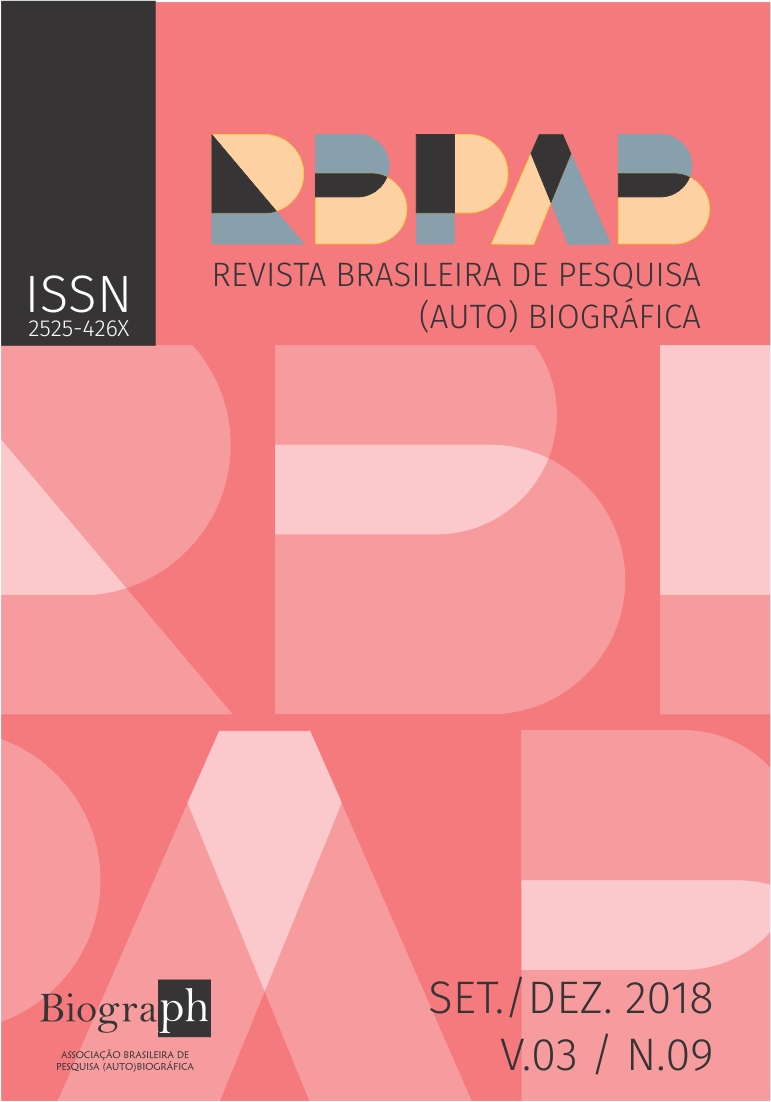Objects in cultural and educational fields a biographical perspective in higher education in Spaint
DOI:
https://doi.org/10.31892/rbpab2525-426X.2018.v3.n9.p885-898Palavras-chave:
Objects, Biographical approach, Higher Education, Learning, Cultural analysis.Resumo
The objective of this paper is to present and discuss a research on objects as educational and cultural analysers, undertaken with a sample of 154 university students in Spain. The participants were asked both to choose five key objects representing their lives and to write short stories about the objects selected and its meaning regarding learning, identity and culture. Firstly, I will discuss the importance of objects from a social and cultural point of view. Then, I will mention the general framework of biographical work that oriented this research. I will describe the concrete activity of object selection and the different oral and written working methods related to them. To illustrate the activity, I will present some cases, including the written comments of the selected objects. Finally, I will comment on the perspectives arising from this activity with the aim of understanding the generational, social, cultural and formative contexts of young people as well as the contributions of this research to biographical work in training, formal education, adult education and cultural fields.
Downloads
Referências
ALHADEFF-JONES, Michel. Time and the Rhythms of Emancipatory Education. Rethinking the Temporal Complexity of Self and Society. London: Routledge, 2017.
ALHEIT, Peter. Biographical Learning. Theoretical Outline, Challenges and Contradictions of a New Approach in Adult Education. In ALHEIT, Peter; BRON, Agniszka; BRUGGER, Elisabeth; DOMINICÉ, Pierre (Eds.). The Biographical Approach in European Adult Education. Wien: Verband Wiener Volksbildung, 57-74, 1995.
BERTAUX, Daniel (Ed.) Biography and Society. London: Sage, 1981.
BEVERLEY, John. Testimonio, Subalternity, and Narrative Authority. In. DENZIN, Norman K; LINCOLNS, Yvonna (Eds.). Handbook of Qualitative Research. Thousand Oak, CA: Sage, 555-565, 2000.
BOLÍVAR, Antonio; DOMINGO, José; FERNÁNDEZ, Manuel. La investigación biográfico-narrativa en educación. Enfoque y metodología. Madrid: La Muralla, 2001.
BRUN, Patrick. Émancipation et connaissance. Las histoires de vie en collectivité. Paris: L’Harmattan, 2001.
BRUNER, Jerome. Actos de significado. Madrid: Alianza, 1991.
CHARLOT, Bernard. Du rapport au savoir. Éléments pour une théorie. Paris: Anthropos, 1997.
CORONA, Sergio Antonio. Testamentos, inventarios y cultura material. México, Mensajero del Archivo Histórico de la UIA Laguna, 29, 3-11, 2001.
http://sitio.lag.uia.mx/publico/seccionesuialaguna/publicaciones/mensajero/Edicion-029.pdf (Access date: 14-07-2018).
COULON, Marie-Jo Coulon; LE GRAND, Jean-Louis. Histoire de vie collective et éducation populaire. Paris: L´Harmattan, 2000.
DELORY-MOMBERGER, Christine. Biographie et éducation. Figures de l’individu-projet. Paris: Anthropos, 2003.
DEMETRIO, Duccio. Raccontarsi. L’autobiografia come cura di sé. Milano: Raffaello Cortina Editore, 1996.
DEMETRIO, Duccio. Ricordare a scuola. Fare memoria e didattica autobiografica. Roma: Editori Laterza, 2003.
DOMINICÉ, Pierre. Learning from our Lives : Using Educational Biographies with Adults. San Francisco: Jossey-Bass, 2000.
DOMINICÉ, Pierre. L´histoire de vie comme processus de formation. Paris: L´Harmattan (2nd ed.), 2002.
FORMENTI, Laura. La famiglia si racconta. La trasmissione dell´identità di genere tra le generazioni. Cinisello Balsamo (MI): San Paolo, 2002.
FRASER, Wilma. Learning from Experience: Empowerment or Incorporation. London: National Institute of Adult Continuing Education, 1995.
GALVANI, Pascal. Quête de sens et formation. Anthropologie du blason et de l’autoformation. Paris: L’Harmattan, 1997.
GAULEJAC, Vincent de. L’histoire en héritage. Roman familial et trajectoire sociale. Paris: Payot, 1999
GONZÁLEZ-MONTEAGUDO, José (2008). Approches non-francophones des Histoires de vie en Europe (Note de synthèse). Pratiques de formation/Analyses, 55, 9-83. Paris: Université Paris 8.
GONZÁLEZ-MONTEAGUDO, José (2011). Jerome Bruner and the Challenges of the Narrative Turn: Then and Now. Journal of Narrative Inquiry (Clark University, USA), 21(2), 295-302.
GONZÁLEZ-MONTEAGUDO, José (2017). Biographical-narrative Methodologies for Adult Education. Between Personal Development and Critical Reflection. Culture, Biography and Lifelong Learning, 3(2), 45-65 (Pusan National University, Busan, South Korea).
LAINÉ, Alex. Faire de sa vie une histoire. Paris: Desclée de Brouwer, 1998.
LANI-BAYLE, Martine. L´histoire de vie généalogique. D´Edipe à Hermès. Paris: L´Harmattan, 1997.
MILLER, Daniel. Artefacts and the meaning of things, In INGOLD, T. (Ed.). Companion Encyclopedia of Anthropology. London: Routledge, 1994, 396-419.
MILLER, Daniel. Why some things matter. In MILLER, D. (Ed.). Material Cultures: why some things matter. London: UCL Press Ltd., 1998, 3-21.
MILLER, Nod ; HENWOOD, Fliss; KENNEDY, Helen. (Eds.). Cyborg lives : Women’s Technobiographies. New York: Raw Nerve, 2001.
MOLINIÉ, Muriel. L’étudiant aux deux langues. Entre formation et migration, mobilité sociale et quête existentielle. In BACHELART, Dominique; PINEAU, Gaston. (Eds.). Le biographique, la réflexivité et les temporalités. Paris: L’Harmattan, 2009, 109-125.
NARANJO, Claudio. Cambiar la educación para cambiar el mundo. Vitoria: La Llave, 2004.
PINEAU, Gaston. Temporalités et formation. Vers de nouveaux synchroniseurs. Paris: Anthropos, 2000.
PLUMMER, Ken. Documents of Life 2. London: Allen & Unwin, 2001.
ROBERTS, Brian. Biographical Research. Buckingham (UK): Open University Press, 2002.
SANZ, Fina. La fotobiografía. Imágenes e historias del pasado para vivir con plenitud el presente. Barcelona: Kairós, 2008.
SOUZA, Elizeu Clementino. Territorios das escritas do eu: pensar a profissão – narrar a vida. Educação, Porto Alegre, Brazil, v. 34, n. 2, p. 213-220, 2011.
STEINER, Claude. La educación emocional. Madrid: Punto de lectura, 2003.













































